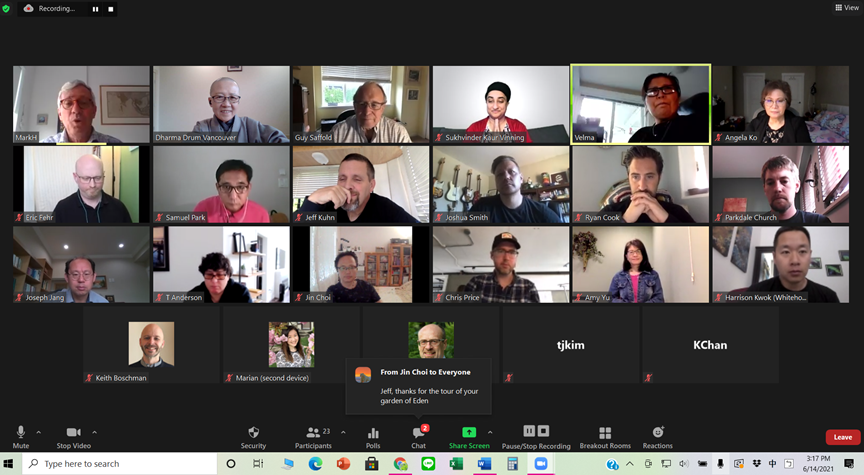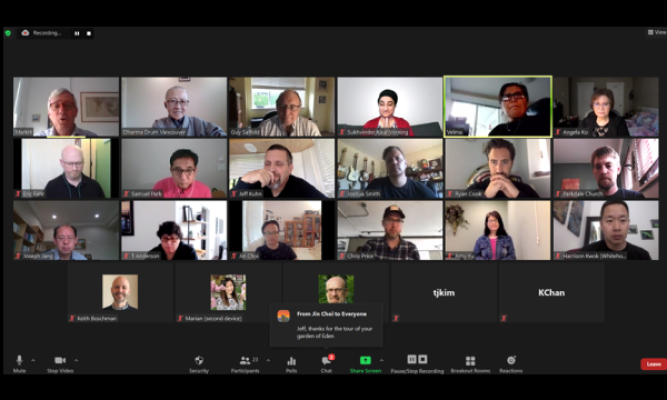DDM Global News
Ven. Chang Wu’s participation in Trinity Western University’s Inter-Religion Seminar
 On June 14, 2021, Venerable Chang Wu was invited by Trinity Western University to participate in a religious seminar held for its doctoral students. There, she had discussions with the representatives of Christianity, Sikhism, and the Indigenous Peoples. After a brief introduction by the host Dr. Hansmen, each panelist explained the core doctrines of their religion followed by a general discussion.
On June 14, 2021, Venerable Chang Wu was invited by Trinity Western University to participate in a religious seminar held for its doctoral students. There, she had discussions with the representatives of Christianity, Sikhism, and the Indigenous Peoples. After a brief introduction by the host Dr. Hansmen, each panelist explained the core doctrines of their religion followed by a general discussion.Velma L. Albert, the representative of the indigenous peoples, gave the first speech. According to Velma, the recent discovery of the remains of 215 indigenous children at the Kamloops Indian Residential School evoked unspoken pain that has existed for a long time. She herself is a Catholic and believes that the issue was not with the doctrine but with the wrongdoings made by the school authorities and related personnel. The great challenge now is to heal the pain of racism and to find hope and strength in faith.
The next religious representative was Sukhvinder Kaur Vinning, who was part of a new tribe derived from Sikhism, established more than a hundred years ago. In the strong rainbow colors of the integration of heaven and earth, this religion tells the tale of long-term persecution resulting from colonialism, being actively involved in society by bringing awareness and letting go of the discrimination and unequal treatment of colonialists.
 Venerable Chang Wu talked about the emergence of spreading the Buddhist Dharma online as a result of the COVID-19 epidemic. This has given people in remote areas and even other countries and continents the opportunity to learn the Dharma. She discussed about how to enable people to learn the Dharma effectively. The delivery of content can be adapted with the change of time so that the younger generations can be interested to learn and engage in the Dharma. According to Venerable Chang Wu, this is the biggest challenge at present and in the future.
Venerable Chang Wu talked about the emergence of spreading the Buddhist Dharma online as a result of the COVID-19 epidemic. This has given people in remote areas and even other countries and continents the opportunity to learn the Dharma. She discussed about how to enable people to learn the Dharma effectively. The delivery of content can be adapted with the change of time so that the younger generations can be interested to learn and engage in the Dharma. According to Venerable Chang Wu, this is the biggest challenge at present and in the future.In the Q&A session, a student who was having a tough time with a family member with disabilities wanted to know the religious attitudes represented by each of the panelists. All panelists expressed that there is no discrimination in their respective religious centers because they have been equipped for people with disabilities. In closing, Venerable Chang Wu said that each of us is actually more or less disabled. She asked "If we can't do something, is that also considered a disability?". We may be physically healthy today but we may be disabled if we encounter an accident tomorrow. When we are sick and are unable to do certain things, bed-ridden with illness or just about to die, we will also experience disabilities. People with disabilities are suffering in their hearts. They may face more challenges, non-adaptability and even unfair treatment from others. These challenges are more difficult than those faced by their caregivers. For these caregivers, companionship, acceptance, and understanding are paramount to allow them to care for the disabled. And they also learn to cultivate patience and tolerance. In addition to physical disabilities, there are psychological insufficiencies and spiritual deficiencies which are even deeper levels of disabilities. Hence, we must learn and grow from various religious beliefs.
Text: Dharma Drum Vancouver Centre
English Translation by Daphne and Miranda Tsai
